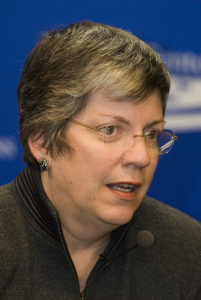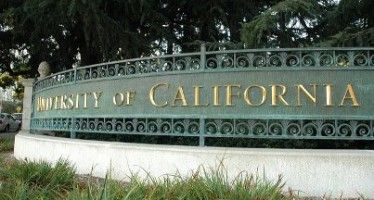Napolitano’s UC nomination a ‘political placement’
Out of a potential pool of more than 300 candidates, Department of Homeland Security Secretary and former Arizona Gov. Janet Napolitano was unanimously nominated to fill in the shoes of retiring UC President Mark Yudof. The UC Board of Regents will vote Thursday on her appointment. If approved, Napolitano will be the 20th president of the UC system and first woman to lead in its 145-year history.
UC Regent Sherry Lansing chaired a 10-member special search committee, by which Napolitano was recommended in a unanimous vote. In a statement, Lancing called Napolitano “a distinguished and dedicated public servant who has earned trust at the highest, most critical levels of our country’s government. She has proven herself to be a dynamic, hard-working and transformative leader.”
California Community Colleges Chancellor Brice W. Harris issued a statement echoing similar sentiments of praise:
“The nomination of Secretary Napolitano to become the next president of the University of California is a truly inspired choice worthy of this great system of higher education. Her focus on education as governor of Arizona and the skills and leadership she has demonstrated as Homeland Security secretary make her uniquely qualified to lead the University of California.”
Even Gov. Jerry Brown said Napolitano had “strength of character and an outsider’s mind that will well serve the students and faculty” and that it would be “exciting to work with her.” Which is rather interesting, considering he criticized the trend of hiring out-of-state presidents in 2011, and wanted UC and CSU officials to specifically seek out Californians.
Napolitano’s lack of academic experience
Contrast that with the reaction of former state senator and education reformer Gloria Romero, who said she was “stunned” upon hearing the news. Romero told me the nomination was a “political placement” and “not wise for the UC system.” The University of California system, she said, is a “premiere institute of research scholarship and faculty.”
“I admire her for what she’s done,” Romero said of Napolitano. “She was a governor and did oversee the University of Arizona system, but this is the UC system.”
Romero questioned Napolitano’s credentials and said the UC president should be someone that would be qualified to oversee “the collaboration and development of curriculum, the training and appreciation for research, and equipping the next generation of scholars.”
She pointed to Charles Reed, the former chancellor of the California State University system, whose tenure, she said, was “always very contentious” because of his minimal ability to “understand or appreciate the role of faculty in the development of curriculum.”
When I asked former UC Regent Ward Connerly of the American Civil Liberties Institute if he thought Secretary Napolitano was qualified to oversee the UC system, he simply said, “Doubtful.”
“There is no evidence that she has any academic experience,” he said of Napolitano. “Faculty often insist on someone that has academic experience.”
Indeed, Napolitano’s credentials fall far short of current UC President Mark Yudof and those before him.
Yudof came to the UC system after being chancellor of the University of Texas system from 2002 to 2008. Before that, he was president of the four-campus University of Minnesota system during 1997-2008. He was also a faculty member and administrator at the University of Texas at Austin for 26 years and dean of its law school from 1984 to 1994, as well as the university’s executive vice president and provost from 1994 to 1997.
Robert C. Dynes, the UC president before Yudof, was a professor of physics at the UC Berkeley during his tenure from 2003 to 2008. He was also the chancellor for UC San Diego from 1996 to 2003, and had been a part of the UC system since 1990.
Former UC President Richard C. Atkinson served before Dynes from 1995 to 2003 and had been chancellor of UC San Diego for 15 years. He was also the former director of the National Science Foundation, past president of the American Association for the Advancement of Science, former chair of the Association of American Universities, and a long-term member of the faculty at Stanford University.
These picks were all clear-cut academics. But the closest that Secretary Napolitano comes to these UC presidents is that she has a law degree. She has no research under her belt, no experience overseeing any academic systems, never taught a college class and isn’t even a native of California, even though proponents of Napolitano’s nomination say that, as governor of Arizona, she was focused “extensively on education.”
Playing politics with UC nomination
What we’re actually seeing, said Ward Connerly, is a “revolving door with academia and Democrat institutions.”
“If you go back and look at the Clinton era, for example,” he told me, “a number of academics were appointed in the second term of Clinton’s administration to prominent university positions.”
And it’s no secret the UC regents and faculty have been very supportive of Obama and his academic policies.
In fact, UC Regent Sherry Lansing, former CEO of Paramount Pictures and head of the search for the incoming UC president, had donated $1,000 to Barack Obama as early as 2004. She’s given hundreds of thousands of dollars to the Democrat Party, its candidates and its PACs.
The nomination looks like a win-win for the Obama administration, as Napolitano, who has become entrenched in scandals on sexual discrimination, immigration enforcement, the Boston bombings and downplaying terrorism, steps down from her post in the Department of Homeland Security. Additionally, Politico notes, her resignation gives Obama “major leeway” to pick a new DHS secretary without needing any Republican support, if Senate Majority Leader Harry Reid follows through with his threat to go ‘nuclear’ and change filibuster rules.
It makes you wonder, asked Gloria Romero, “What is she doing? Who called whom? Who negotiated what and how did they place her? With these scandals brewing, it just doesn’t make sense.”
Ward Connerly told me it was “hard to say if faculty would oppose” such a nomination, or if the academic senate would respect her at all. “UC needs someone adept at bringing outside financial support,” he said. “While we seem to have turned a corner on the economy, UC is not out of the woods yet.”
The special session to vote on Secretary Napolitano’s nomination occurs Thursday, July 18, at 1:45 pm.
(Katie Hillery contributed research to this article.)
Related Articles
Gov. Brown mangles Aristotle on school funding
Jan. 15, 2013 By John Seiler Gov. Jerry Brown continues to misuse his fine Jesuit education. Explaining why he wants
Lawsuit argues CA education spending is constitutionally insufficient
When it comes to lawsuits arguing that California’s education system is unfair and unconstitutional, the Vergara v. California case has
CalSTRS pension fix harder on taxpayers than UC fix
In the newly enacted 2015-16 state budget, the University of California has agreed to major pension changes, building on revisions





